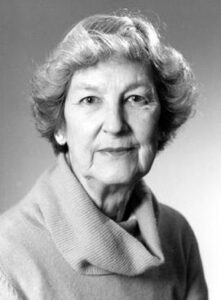The development of in vitro fertilization (IVF) is a testament to human resilience, scientific curiosity, and the unwavering spirit of pioneers who dared to challenge the boundaries of reproductive medicine. Their groundbreaking work paved the way for countless families to experience the joy of parenthood.
Miriam Menkin: The First to Extract an Intact Fertilized Egg
Miriam Friedman Menkin (1901–1992), an American scientist, etched her name in history as the first person to conceive human life outside the body. Her collaboration with Dr. John Rock led to significant advancements in IVF research. Born Miriam Friedman in Riga, Latvia, her family relocated to the United States when she was a child. Menkin graduated from Cornell University in 1922 with an undergraduate degree in Histology and Comparative Anatomy, before earning a master’s degree in Genetics from Columbia University.
In 1948, Menkin achieved a groundbreaking feat by extracting an intact fertilized egg. Together with Dr. Rock, She retrieved over 800 oocytes, exposing 138 of them to spermatozoa in vitro. The findings were published in the American Journal of Obstetrics and Gynecology. Menkin’s work laid the foundation for subsequent breakthroughs in assisted reproductive technologies.
Anne McLaren: Pioneering Embryology and IVF Techniques
Anne McLaren (1927–2007), a British developmental biologist, left an indelible mark on embryology and IVF technology. She researched fertility, development and epigenetics, including the development of embryonic transfer, immunocontraception, and the skeletal characteristics of chimerae.
Her collaboration with Dr. John Biggers in 1958 was a turning point in IVF, when they successfully grew mouse embryos in vitro and transferred them into female mice, demonstrating that it was possible to mix a sperm and an egg outside the reproductive organs and create a healthy embryo.
Aside from her groundbreaking work in reproductive medicine, the experience of raising three children as a divorced single career parent made McLaren a vocal advocate for government assistance towards childcare.
In 2002, McLaren was a recipient of the Japan Prize for contributions to developmental biology, and she was awarded the March of Dimes Prize in Developmental Biology in 2007.
Georgeanna Seegar Jones: Discoveries with Progesterone and Endocrinology
Georgeanna Seegar Jones (1912–2005), an American physician, played a pivotal role in early IVF. Born July 6, 1912, in Baltimore, Maryland, her father was an obstetrician, one of the factors which contributed to Seegar Jones’s interest in reproductive medicine from an early age.
 She received her bachelor’s degree in 1932 from Goucher College and continued to pursue her medical career at Johns Hopkins University School of Medicine, where she earned her medical degree (MD). She completed her training as a house gynecology officer and an acting member of the National Cancer Institute.
She received her bachelor’s degree in 1932 from Goucher College and continued to pursue her medical career at Johns Hopkins University School of Medicine, where she earned her medical degree (MD). She completed her training as a house gynecology officer and an acting member of the National Cancer Institute.
Collaborating with her husband Dr. Howard W. Jones, she worked tirelessly to make IVF a reality. In 1978, their efforts culminated in the birth of Elizabeth Carr, the first baby conceived through IVF in the US, marking an historic moment. Georgeanna’s unwavering commitment to reproductive medicine transformed countless lives and ignited hope for infertile couples worldwide.
Georgeanna Seegar Jones received the Distinguished Scientist Award from the Society for Reproductive Investigation in the year 2000.
BONUS: Louise Brown, the World’s First IVF Baby, and Elizabeth Carr, the First IVF Baby in the United States
Louise Joy Brown (1978–Present), born on July 25, 1978, in Oldham, UK, holds a unique place in history as the world’s first baby conceived through IVF. Her birth was a triumph of science, perseverance, and hope. Louise’s arrival not only brought joy to her parents but also ignited a revolution in reproductive medicine. She remains an inspiration for countless families who have since welcomed IVF babies into their lives.
Elizabeth Jordan Carr (1981–Present), holds the distinction of being the first IVF baby born in the United States. Born on December 28, 1981, in Norfolk, Virginia, she symbolized hope and progress. Elizabeth’s birth shattered barriers and sparked conversations about assisted reproductive technologies in the US.
Historic Legacy
Behind every IVF — and gestational surrogacy — success story lies the spirit of these extraordinary women, whose contributions continue to resonate across generations. They continue to inspire future generations of scientists, dreamers, surrogates and parents.



